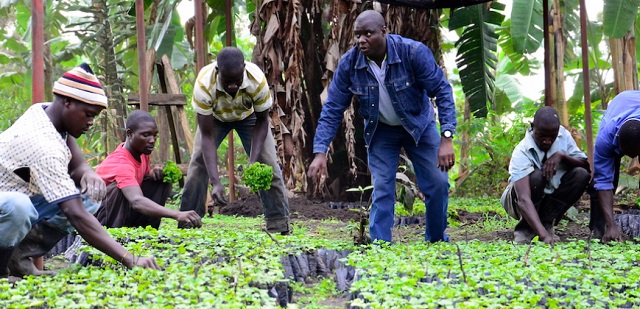
UCDA’s mega plan for Northern Uganda Coffee
Gulu, Uganda | THE INDEPENDENT | Nursery bed operators in West Nile have been urged to invest in multiplying coffee seedlings.
Uganda Coffee Development Authority-UCDA is currently urging farmers in Northern Uganda to embrace large-scale coffee growing, owing to its abundant and conducive land for the enterprise, and the goal produce 20 million bags of coffee by 2030.
In the West Nile sub-region, registration of coffee farmers started in November.
Herbert Obaku a field coordinator at Pula Uganda, one of the companies contracted to establish a database of coffee farmers, said they have so far mapped 12,000 farmers who were already growing coffee.
“People have a perception that there is no coffee in West Nile, but there is, only that we have not been paying attention to establish the presence of coffee in these areas,” Obaku said.
Leaders UCDA say the large number of coffee farmers offers a great opportunity for nursery bed operators to multiply coffee seedlings.
In Northern Uganda, there are plans to distribute 19,000,000 coffee seedlings to farmers in the next planting season, which starts in April 2025. If each seedling is sold at 1,500, the region will get 28.5 billion Shillings that will be injected into purchasing the seedlings.
However, UCDA officials are concerned that the nursery bed operators in West Nile might miss this opportunity because they are not nurturing coffee seedlings.
Andama Otubo, the Regional Coffee Technical Officer-Mid North, revealed that he was disappointed when he went to Zombo district, which is the third largest producer of coffee in the county, and found only one person with a nursery bed for coffee seedlings.
Otubo cautioned that if nursery bed operators do not invest in the business, the seedlings will be procured from Central Uganda, as has always been the case.
Charles Etoma, the Regional Coffee Extension Officer at UCDA, argued that business people in West Nile always want quick money, and easily get discouraged and disappointed in projects like multiplying seedlings, which returns might take time to come, though lucrative.
Etoma pledged to farmers interested in joining the business of multiplication of coffee seedlings to contact them for support on the cost-benefit analysis of setting up a nursery bed, and how to manage the coffee nursery or mother gardens.
Records from UCDA show that 127,184 households in Northern Uganda are growing coffee and producing 962,278 60-kilogram bags of coffee beans annually.
*****
URN
 The Independent Uganda: You get the Truth we Pay the Price
The Independent Uganda: You get the Truth we Pay the Price



